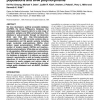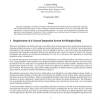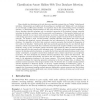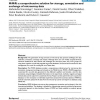118
Voted
NAR
2000
15 years 1 months ago
2000
EcoCyc is an organism-specific Pathway/Genome Database that describes the metabolic and signaltransduction pathways of Escherichia coli, its enzymes, and--a new addition--its tran...
NAR
2000
15 years 1 months ago
2000
We have developed a publicly accessible database (ALFRED, the ALlele FREquency Database) that catalogues allele frequency data for a wide range of population samples and DNA polym...
117
Voted
FUIN
2000
15 years 1 months ago
2000
Knowledge scouts are software agents that autonomously search for and synthesize user-oriented knowledge (target knowledge) in large local or distributed databases. A knowledge ge...
132
click to vote
BMCBI
2002
15 years 1 months ago
2002
Background: Most profile and motif databases strive to classify protein sequences into a broad spectrum of protein families. The next step of such database studies should include ...
123
Voted
BIB
2002
15 years 1 months ago
2002
The process of building a new database relevant to some field of study in biomedicine involves transforming, integrating, and cleansing multiple data sources, as well as adding ne...
115
Voted
BMCBI
2004
15 years 2 months ago
2004
Background: Multi-locus sequence typing (MLST) is a method of typing that facilitates the discrimination of microbial isolates by comparing the sequences of housekeeping gene frag...
122
click to vote
TOIS
2008
15 years 2 months ago
2008
Many valuable text databases on the web have non-crawlable contents that are "hidden" behind search interfaces. Metasearchers are helpful tools for searching over multip...
117
click to vote
BMCBI
2005
15 years 2 months ago
2005
Background: SRS (Sequence Retrieval System) has proven to be a valuable platform for storing, linking, and querying biological databases. Due to the availability of a broad range ...
118
click to vote
BMCBI
2005
15 years 2 months ago
2005
Background: Structural and functional research often requires the computation of sets of protein structures based on certain properties of the proteins, such as sequence features,...
105
click to vote
BMCBI
2005
15 years 2 months ago
2005
Background: The generation of large amounts of microarray data presents challenges for data collection, annotation, exchange and analysis. Although there are now widely accepted f...




